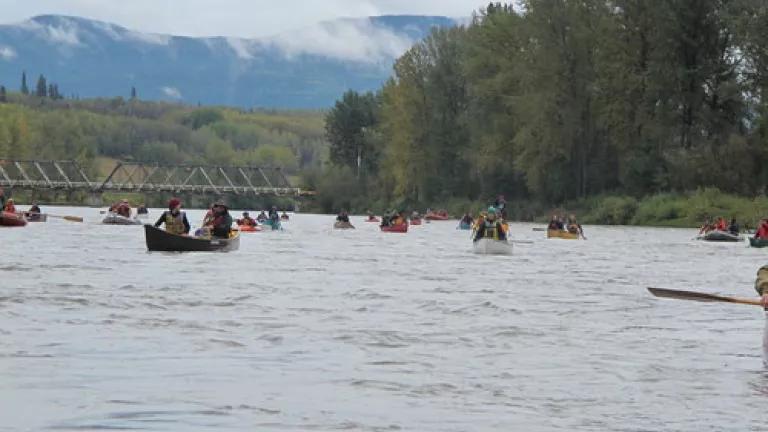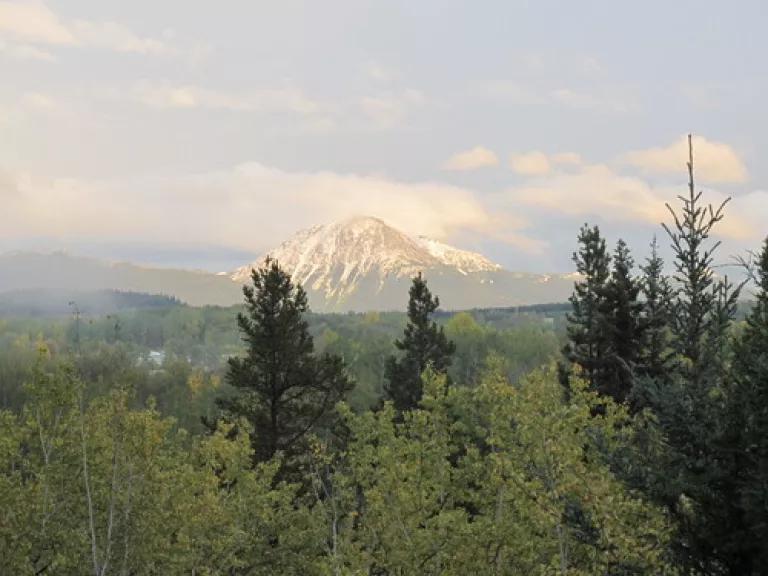British Columbia has better options than bringing tar sands oil across its lands and waters to the coast

Paddling the Bulkley River in British Columbia on River Day
Yesterday, catching us by surprize after a rain-free day out on the river, we had the first snowfall of the season. Up in northern British Columbia, Canada in a town called Smithers that is. I am here on the trail of the proposed Enbridge Northern Gateway pipeline that would bring tar sands from Alberta across the Rockies and miles of pristine wilderness to the coast. This is another of the tar sands projects that would affect the lands, waters, hearts and livelihoods of thousands of people. It would bring the danger of tar sands oil spills into the home of the majestic Spirit Bear, rivers teaming with wild salmon and coastal waters swimming with whales, orcas, and dolphins. Tar sands could destroy the way of life in this part of British Columbia for the people and the wildlife. This cannot be allowed to happen and there are many First Nations and local community members who have been working hard for many years to show that British Columbia has better options for its economic development and way of life than tar sands oil pipelines.
As I was listening to the people who live and work here discuss their concerns with this tar sands pipeline, hundreds of people were being arrested in Ottawa, as they voiced their concerns about tar sands and pipeline such as the proposed Keystone XL project from Canada to the Gulf Coast. It was also the first day of hearings on the proposed Keystone XL pipeline. Hundreds came out in Port Arthur, Texas where tar sands would only bring more pollution to communities suffering under existing oil refining. And in Topeka, Kansas, Rabbi Moti Rieber, representing the Kansas Interfaith Power & Light, said the proposed 1,700-mile Keystone XL project was an environmental disaster waiting to happen and place land, water and air resources at risk.
The strip-mining and drilling for tar sands from deep under the Boreal forest takes place in northern Alberta. But its impacts would reach along proposed pipeline corridors to the west, the east and the south. The people in northern British Columbia are right in their concern about what bringing tar sands through their mountains, over their rivers and into their marine ecosystems would mean for their way of life. Tar sands is more corrosive and more likely to leak from pipelines. In a terrain where roads regularly wash out in floods, landslides take out pipelines, spills from a tar sands pipeline unfortunately become something that we can expect. Even in easy to access areas tar sands are harder to clean up than conventional oil – just look at how the spill of tar sands oil from the Enbridge pipeline in Michigan is still not cleaned up more than one year after it happened. Now imagine northern British Columbia with its high mountains, remote valleys and wild rivers. A spill in this area could go unnoticed and would be very hard to access and clean up.
And what are the main concerns of the people in this region? Over 100 First Nations oppose this tar sands pipeline and the prospect of large oil tankers entering this region. The First Nations’ Fraser River Declaration bans the tar sands pipeline from coming through their territories – in fact it bans tar sands from all of the migration routes of the Fraser River Salmon. This Declaration is based on ancestral laws, title, rights and responsibilities of these Nations.
The Skeena watershed of northern British Columbia is critical salmon habitat and salmon truly are the lifeblood of this region. Salmon in a river mean that the whole river is healthy. People come from all over the world to fish the Morice and Bulkley Rivers near Smithers, also feeding the local economy. The Skeena River provides most of the fish for the north coast commercial fishing fleet. The tar sands pipeline would cut through the landscape of these critical rivers. Salmon are also a main source of food for the Kermode bear a rare white variation of the Black bear that the local First Nations call the “Spirit Bear”. The beautiful Spirit Bear has become a symbol of this coast and the importance of its survival for the wellbeing of all of the wildlife that thrives there. In fact, not only would the proposed Enbridge tar sands pipeline mean danger for these rivers, but also for sensitive inner coastal waters. Along the coast of British Columbia, the ocean and land meet in a mosaic of bays, channels, fjords, inlets, and estuaries. The rocky beaches come down to the water from ancient stands of thousand-year-old hemlocks, cedars and Sitka spruce. More than a dozen marine mammal species — including fin whales, humpbacks and threatened orcas — thrive in these rich coastal waters.
Bringing tar sands to this coast would not only mean the treacherous passage for the pipeline over rivers and wildlands, but it would also open the coast to large oil tanker traffic that would need to come into the town of Kitimat to be shipped out still in the form of raw tar sands oil to Asia or California markets. These difficult to navigate sensitive inner coastal waters of the central and north coast of British Columbia have in fact been closed to large oil tanker traffic since the early 1970’s. More recently in 2010 the Coastal First Nations put a ban in place on large oil tankers coming into these waters. This ban is also based on ancestral law and must be respected by tankers and should be confirmed in federal law by the Canadian government.
Expansion of the tar sands is not in Canada’s national interest, especially not when it depends on the possible devastation of rivers and the way of life for First Nations and communities. British Columbia should be doing what it can to prevent the approval of Enbridge’s tar sands pipeline. And the Canadian federal government should put a ban on large oil tanker traffic and not allow the interests of Big Oil to trump the interests of First Nations and the people of British Columbia.
Thanks to the many people and organizations who along with the First Nations have been working for years to keep the BC mountains, rivers, and coastal waters tar sands oil free: Friends of the Wild Salmon, Northwest Institute, Friends of Morice Bulkley, Steelhead Society, Dogwood Initiative, Living Oceans, Pacific Wild, Sierra Club of British Columbia, West Coast Environmental Law, The Pembina Institute, Raincoast Alliance, Douglas Channel Watch, Headwaters Initiative, Forest Ethics, BC Nature, and T Buck Suzuki.

